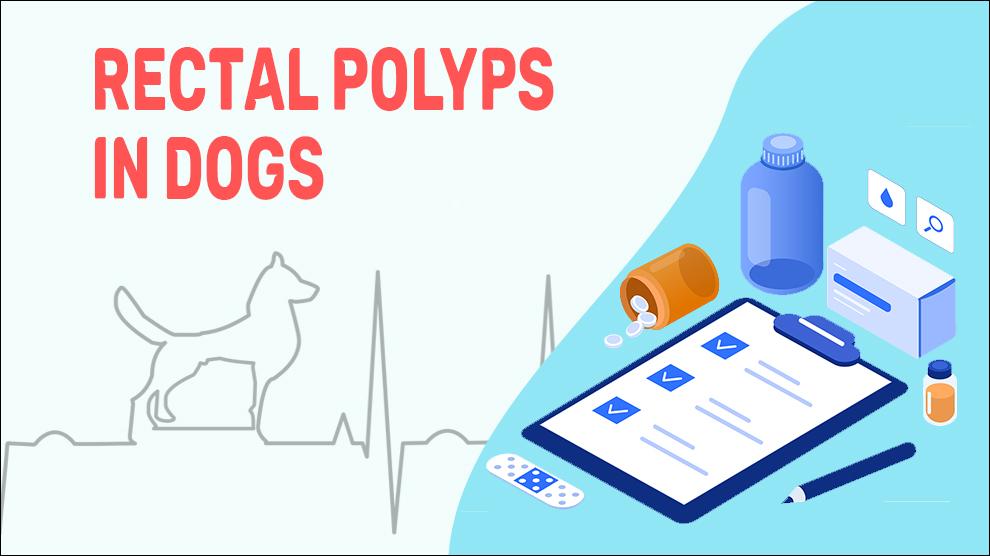Rectum is at the distal portion of the large intestine converging into the anal canal and proximally bound by the sigmoid colon. This region is a temporary reservoir of wastes from the colon before it is evacuated (defecation) through the opening called the anus. They also play an integral role in maintaining continence as well as controlling defecation.
A polyp is an atypical growth of tissues on the inside layer of the colorectal region. Colon and rectal polyps usually occur in older dogs. Not all polyps will become malignant but most colorectal cancers develop gradually from benign polyps (adenomas), sessile serrated lesions, or abscesses in that region.
Based on the size, there are two types of polyps.
Sessile (flat, dome-shaped) and pedunculated (with mushroom-like stalks).
Sessile polyps account for almost 90%. Pedunculated polyps are conspicuous umbrella-like mushroomic tissue growths that attach to the end of the long, thin stalk at the mucous membrane of the colon.
Complex polyps are somewhat bigger polyps and it will be in an unfavorable location or too sessile for removal by simple techniques. Larger the size of the polyp, the greater the potential.
Colorectal Hyperplastic polyps are benign protrusions that are often small and found in the rectum and are not a cause for concern. Most Hyperplastic polyps will not become malignant (in almost 90% of the cases), but some can gradually become cancerous over a period of time due to unknown reasons.
Symptoms Of Rectal Polyps
- Constipation, obstipation, dyschezia, tenesmus
- Itchy anus
- Change in bowel habits
- Narrow or ribbon-like Stools or /black/ tarry stools
- Hematochezia –blood in the feces
- While defecating, the dog cries/ whimpers
- Polyuria, polydipsia
Treatment Options For Rectal Polyps
- Discuss the best treatment option with your veterinarian or canine oncologist. When the polyps get large and cause discomfort or other symptoms, then they may be surgically removed.
- Colonoscopy (polypectomy) is used to remove polyps.
- Endoscopic mucosal resection- for larger polyps.
- Smaller villous adenoma polyps - removed during a colonoscopy.
- Stereotactic radiosurgery: High dose of radiation aimed exactly at the adenoma from different directions to stop the tumor from growing.
Home Remedies For Rectal Polyps
Check with your veterinarian or Veterinary oncologist for the post-surgical checks, usually once a month to ensure the health of the dog and to check for any infection.
Until the post-operative recovery period is over, do not allow your dogs to play outdoors. This will reduce the risk of infection and injuring the surgical site.
Prevention Of Rectal Polyps
Rectal polyps etiology is poorly understood. Specific causes are not yet known. However, Hereditary is, perhaps a factor in some breeds and it is better to evaluate the affected dogs before breeding or at least before getting a dog from a susceptible lineage, and get the health checks done.
Affected Breeds Of Rectal Polyps
German Shepherd, Collie, Middle Age Dogs, Samoyed, Senior Dogs, Beagle, Bulldog, Cavalier King Charles spaniel, Dachshund, Fox Terrier, Siberian Husky
Additional Facts For Rectal Polyps
1. Causes:
It is alleged that there is a genetic component (accidental changes in DNA) linked to the odds of this condition occurring, supported by higher incidence in certain breeds. These changes caused in the DNA can be passed down hereditarily, but usually happen on their own sometime during a dog’s life.
2. Types:
Adenomatous
- A most prominent type of colon polyp and it accounts for almost 70%
- This is also called a tubular adenoma
Hyperplastic
- Serrated polyp type
- Cancer potential - low risk.
Serrated
- Cancer potential- high risk
- Smaller serrated polyps- called hyperplastic polyps-located in the distal colon. They rarely become malignant.
- Bigger serrated polyps- located in the proximal colon, can become malignant.
Inflammatory (pseudopolyps)
- Connected with inflammatory bowel disease
- They are not considered proper polyps (pseudopolyps), as they develop as a result of chronic inflammation of the colon.
Villous Adenoma and Tubulovillous Adenoma
- Villous adenoma- fingerlike projections (cancer potential: high risk 40%)
- Tubulovillous – tubular as well as finger-like projections (cancer potential: low risk -20%)
- Both account for almost 15 percent
- cancer potential- high risk
- They are usually sessile
3. Mortality:
Rectal polyps are a benign condition and usually do not always progress to malignancy as the tumors often don't change much over time.
4. Diagnosis:
- Complete blood count (CBC), blood chemistry profile
- Electrolyte panel
- Urinalysis/ Faecal analysis
- Gut biopsies: include mucosal biopsies of the stomach,duodenum, and/or ileal mucosa (ileoscopy)
- Virtual colonoscopy ( CT colonography)
5. Prognosis:
The prognosis for rectal polyps is really good. As the existing condition is not life-threatening, no rigorous treatment is usually necessary. However, relapse is possible following medical treatment in affected dogs.
When To See A Vet
Contact your vet right away, if you notice any of the following:
- Narrow or ribbon-like Stools or /black/ tarry stools
- Hematochezia –blood in the feces
- While defecating, the dog cries/ whimpers
Food Suggestions For Rectal Polyps
- Low fat, high protein foods - White-Fleshed Fish, Skinless, White-Meat Poultry, Beans, Peas, and Lentils.
- Protein: High protein diet comprises 35- 50% of the dog's calories.
- Protein - Chicken breasts, turkey breasts, liver, ½ Cup Raw Salmon (or cooked).
- Lean meats, such as chicken breast, sirloin, or pork.
- Fats - Chicken/turkey fat or beef tallow.
- DHA-mackerel, salmon, herring, sardines, and caviar.
- Complex Carbohydrates: Fibers and starches (Whole Grains, Oatmeal, Brown Rice, Potatoes & Sweet Potatoes).
Conclusion
As most rectal polyps for affected dogs are incidental and benign, they do not require treatment or monitoring over time. The Prognosis is also excellent. Some polyps are large and hamper rectum function, they are warranted for long-term monitoring.

















